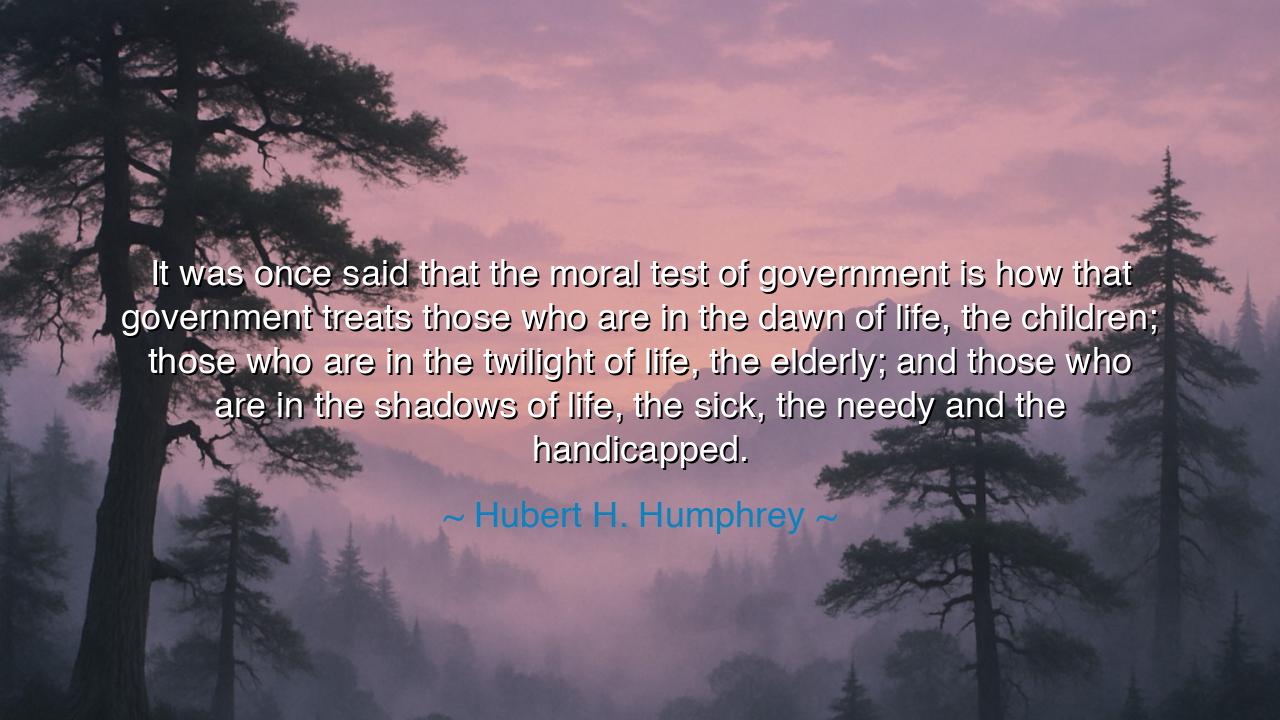
It was once said that the moral test of government is how that
It was once said that the moral test of government is how that government treats those who are in the dawn of life, the children; those who are in the twilight of life, the elderly; and those who are in the shadows of life, the sick, the needy and the handicapped.






“It was once said that the moral test of government is how that government treats those who are in the dawn of life, the children; those who are in the twilight of life, the elderly; and those who are in the shadows of life, the sick, the needy, and the handicapped.” — Hubert H. Humphrey
Listen, O keeper of conscience, for in these words lies the heart of justice. When Hubert H. Humphrey, the American statesman, spoke these lines, he did not speak as a politician seeking applause but as a prophet calling humanity to remembrance. His vision pierced beyond laws and budgets, into the moral soul of governance itself. He declared that the worth of a nation is not measured in its wealth or armies, but in how it shelters the weakest beneath its wings — the children, whose eyes have just opened to the world; the elderly, whose eyes are dimming with years; and the forgotten ones, who dwell in the shadows of suffering and need.
This truth was born in a time when the world was rebuilding itself from the ashes of war and the turmoil of inequality. The twentieth century had seen both the grandeur of progress and the cruelty of indifference. Humphrey, who had witnessed the struggles of the poor and the rise of the civil rights movement, understood that power without compassion is a tyranny of a different kind — a tyranny of neglect. He believed that the “moral test of government” was not in the grandeur of its monuments but in the mercy of its actions; not in the noise of its rhetoric, but in the quiet protection it gives to those who cannot defend themselves.
Throughout history, every age has faced this test. The Roman Empire, at its height, built roads, temples, and armies — yet when it ceased to care for its poor, when the hungry cried out and no hand was extended, its glory began to rot from within. The French Revolution, too, was not born of ambition alone, but of the people’s cry for bread while their rulers feasted. When governments forget the humble, they invite their own destruction. For as the ancient prophets warned: a kingdom divided from compassion is a kingdom destined to fall.
Consider the story of Eleanor Roosevelt, who, in the shadow of her husband’s presidency, championed the cause of the destitute and the vulnerable. She walked among the orphans, the workers, and the displaced, seeing not burdens but human souls. It was through her compassion and tireless advocacy that the Universal Declaration of Human Rights was born — a testament that the dignity of each life must be preserved, not by charity alone, but by justice. Her life embodied Humphrey’s moral vision: that the strength of a nation is revealed in its tenderness.
The children — the “dawn of life” — are the seeds of every future. When a government nourishes their minds and bodies, it invests not merely in citizens, but in destiny. The elderly, the “twilight of life,” are the keepers of memory and wisdom. When a society honors them, it preserves its own heritage. And the sick and needy, those “in the shadows,” are the measure of our humanity. To uplift them is to reaffirm the sacred bond that ties each life to all others — the bond of shared mortality, shared suffering, and shared hope.
Let it be known, therefore, that morality is not written in constitutions but in compassion. The test of leadership is not how many obey, but how many are healed. The wise ruler does not rule for glory, but for goodness; does not serve the strong alone, but gives strength to the frail. For when a government turns its face away from the weak, it loses the very heart of its authority — the right to call itself humane.
So, O listener, take this teaching into your own life: you, too, are a governor — of your home, your community, your sphere of influence. Ask yourself daily the same moral test that Humphrey spoke: How do I treat those in the dawn, the twilight, and the shadows of life? Feed the hungry when you can, defend the helpless when others turn away, and speak for the silent even when your voice trembles. For a nation is not only built by laws, but by hearts that refuse to harden. And when compassion reigns — when mercy becomes policy and justice becomes habit — then, and only then, may a people truly call themselves free.
Remember always: civilizations rise not by conquest, but by care. And as long as there are hands to lift the fallen and hearts to love the forgotten, the light of humanity — though it flicker — shall never perish from the Earth.






AAdministratorAdministrator
Welcome, honored guests. Please leave a comment, we will respond soon